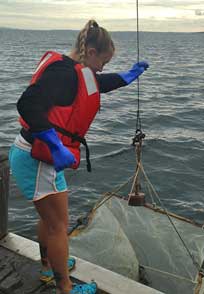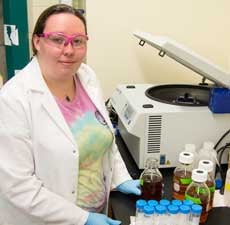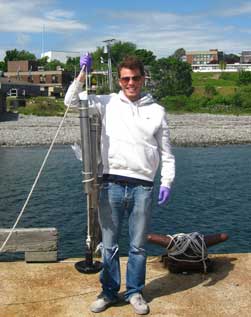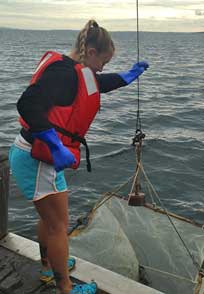 NARRAGANSETT, R.I. – July 28, 2014 – Undergraduate students from 14 colleges and universities around the country are spending 10 weeks this summer conducting cutting-edge oceanographic research through the University of Rhode Island’s Summer Undergraduate Research Fellowships in Oceanography program. Now in its 30th year, the program was the first of its kind in the nation.
NARRAGANSETT, R.I. – July 28, 2014 – Undergraduate students from 14 colleges and universities around the country are spending 10 weeks this summer conducting cutting-edge oceanographic research through the University of Rhode Island’s Summer Undergraduate Research Fellowships in Oceanography program. Now in its 30th year, the program was the first of its kind in the nation.
The students — from Middlebury College, the University of California at Davis, Worcester Polytechnic Institute and New York University, among others – were each assigned to a research project led by faculty and graduate students at the URI Graduate School of Oceanography to gain an appreciation for the interdisciplinary character of marine science research.
“This program allows us to share our enthusiasm for oceanography with undergraduate students and make them aware that training in the basic sciences or engineering is both applicable and necessary for the complex challenges facing oceanographic researchers,” said Kathleen Donohue, associate professor of oceanography and co-coordinator of the program.
Emily Slesinger, for instance, is working with URI Research Professor Ted Smayda studying jellyfish called ctenophores in Narragansett Bay to see if their populations are changing due to the warming waters. “They’re native here, but they’re also voracious predators,” said Slesinger, a San Diego native and student at the University of California at Santa Cruz. She said that if the ctenophores appear in the bay earlier in the season and in larger numbers, as is predicted, they might consume the majority of copepods that are food to many other marine species.
To understand the effect of the ctenophores, Slesinger is assisting with a weekly trawl for plankton and ctenophores aboard the URI boat Cap’n Bert and analyzing 30 years of data from previous trawls.
“I really like that I’ve been given a lot of independence on this project,” Slesinger said. “It was presented to me like it’s a mystery to solve, which I love. It’s really making me excited about going to grad school.”
 Syracuse resident Cassandra Beaulieu said her experience at the Graduate School of Oceanography this summer is exactly what she hoped. Under the guidance of Associate Professor Rebecca Robinson, she is calculating the quantity of nitrogen being discharged into Narragansett Bay from wastewater treatment facilities and assessing how the ecosystem copes with it.
Syracuse resident Cassandra Beaulieu said her experience at the Graduate School of Oceanography this summer is exactly what she hoped. Under the guidance of Associate Professor Rebecca Robinson, she is calculating the quantity of nitrogen being discharged into Narragansett Bay from wastewater treatment facilities and assessing how the ecosystem copes with it.
According to Beaulieu, human sources of nitrogen in the bay can cause algal blooms that deplete the water of oxygen and can have negative implications for other marine life. So she analyzes water samples for their nitrogen composition using a mass spectrometer.
“This project was the perfect fit for me,” said Beaulieu, a student at SUNY College of Environmental Science and Forestry. “I knew it would be a lot of analytical work in the lab, which is ideal. When I see the data come out in front of me, that’s the best part.”
 Michael Vansco is also spending much of the summer in a lab at the URI Bay Campus. A URI chemistry major from Rahway, N.J., he is testing whether a common sampling method of measuring chemical pollutants in the ocean also works for a new group of contaminants, including flame retardants and antimicrobial compounds found in soaps. He extracts chemical compounds from passive samplers and uses gas chromatography and mass spectrometry to determine the quantity of pollutants in each sample.
Michael Vansco is also spending much of the summer in a lab at the URI Bay Campus. A URI chemistry major from Rahway, N.J., he is testing whether a common sampling method of measuring chemical pollutants in the ocean also works for a new group of contaminants, including flame retardants and antimicrobial compounds found in soaps. He extracts chemical compounds from passive samplers and uses gas chromatography and mass spectrometry to determine the quantity of pollutants in each sample.
“I like getting the feel of what it’s like to be a full-time researcher,” said Vansco, who is working with Professor Rainer Lohmann. “And every week we hear from GSO alumni who talk about how their careers evolved, which gives us a good idea of the different career paths we can pursue after college.”
According to David Smith, associate dean of the Graduate School of Oceanography and co-director of the program, the URI Summer Undergraduate Research Fellowships in Oceanography program is often used as a recruiting tool for future graduate students.
“Many of our current students had their first experience on campus as an undergraduate research fellow,” he said. “The program gives us a chance to see if they’re really interested in oceanography or just here for summer fun.”
The program has been funded by the Office of Naval Research, the Department of Defense and the National Science Foundation. More than 200 students have participated through the years, and 75 percent have pursued graduate school in a science, math or engineering discipline.
Photos of Emily Slesinger and Michael Vansco were provided by the students.
Cassandra Beaulieu photo by Nora Lewis

